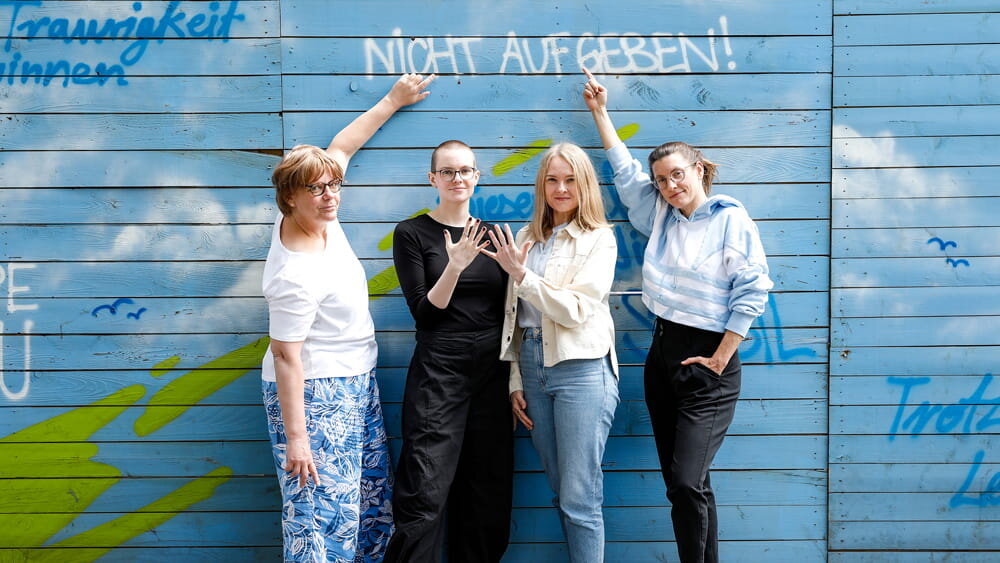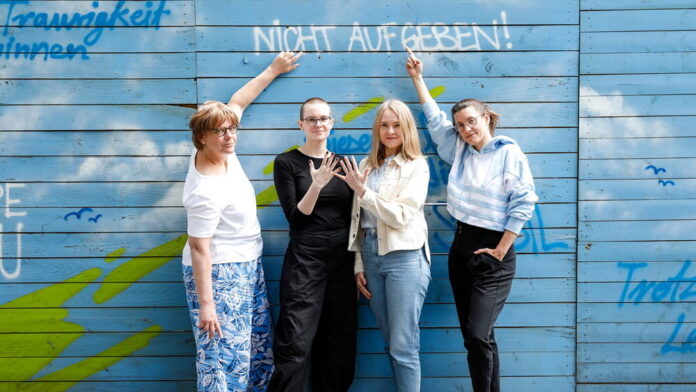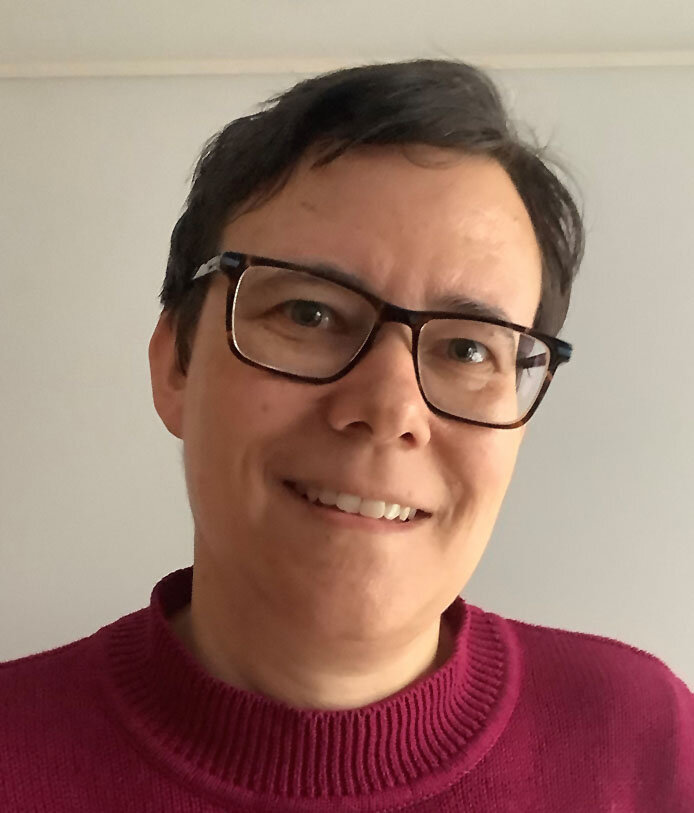
For a decade, the Frankfurt Network for Suicide Prevention has been helping to save lives


Inform, raise awareness, help – for ten years, the Frankfurt Network for Suicide Prevention (FRANS) has been helping to prevent suicides. The network was founded in June 2014 on the initiative of the health department. Why it was founded, how it has developed over the years, what goals it pursues, what methods it uses to achieve this, why its work is so valuable and why those affected are committed to FRANS – ten voices on ten years of FRANS.


The federal government’s suicide prevention strategy was presented at the beginning of May. As the head of the health department of the city of Frankfurt, what do you hope to achieve with a suicide prevention law?
Elke Voitl, head of the social and health department, says: “Every year around 10,000 people die by suicide in Germany, in Frankfurt alone there are around 90 people per year. The number of suicide attempts is many times higher and the suffering of those affected and their families is immeasurable. In order to effectively prevent suicide, we must take the subject out of the taboo zone. Regional offers are necessary that reach people in their everyday lives. A suicide prevention law should therefore take existing structures into account and support them. As a municipality, we also need reliable funding commitments that provide planning security.”
What is the goal of FRANS?
Dr. Peter Tinnemann, head of the Frankfurt Health Department, says: “FRANS has been doing great educational work for ten years and has brought the difficult topic of suicide to the attention of the public through events and campaigns. In this way, it counteracts the stigmatization that people with suicidal thoughts or who have attempted suicide, as well as their relatives, are often exposed to. The FRANS team bundles information about support services, such as our department’s social psychiatric service as a contact point for mental crises, and makes it available on frans-hilft.de, among other places. And: FRANS has set itself the goal of improving the data situation in Frankfurt and records various key figures on the topic of suicide. On the basis of these figures, not only is prevention work geared to specific local needs possible, but potential suicide hotspots in the city can also be identified and the team can work towards securing certain buildings and sections of rail.”
Why is it right to locate a network like FRANS in a health authority?
Dr. Christiane Schlang, head of the Mental Health Department at the Health Department, says: “Health promotion, prevention and health protection are the primary tasks of the public health service. Since the risk of suicide is significantly higher with mental illness, I see the responsibility to initiate and establish suicide prevention measures at the municipal level, primarily at the health departments. The structures and relationships on site are known there. Needs within the city or municipality can be taken into account, those involved can be involved and exchange with local politicians can be ensured. The individual network members then contribute to implementing suicide prevention measures ‘at the grassroots level’. Creating healthy living conditions will become an increasingly urgent social and health policy necessity. That is why, on FRANS’s birthday, I hope that more health departments will follow our example and initiate similar networks.”
Why is it so important to talk openly about suicide?
Inga Beig, FRANS network coordinator in the health department, says: “Unfortunately, the subject of suicide is still very taboo in our society. If it is discussed at all, it is only discussed behind closed doors. But it must be possible to talk about suicidality without being judged. This is what we at FRANS are committed to. If a person with suicidal thoughts feels that they are not allowed to talk about their thoughts, then they will not seek help. We want everyone to know that there is help. Even for this seemingly hopeless situation. If we had the opportunity, we would draw attention to the subject of suicide and offers of help on the large billboards to the right and left of the motorways across Germany. Because suicide is not a niche topic: the number of people who take their own lives in Germany every year is greater than the number of victims of murder and manslaughter, and those who die from HIV, traffic accidents and the use of illegal drugs combined.”
How can we bring the issue of suicide into the public eye?
Nora Hausschild from FRANS says: “We are always thinking up new formats with which we can bring the topic of suicide closer to people and with which we can encourage them to think. We usually choose September for our campaigns, which is World Suicide Prevention Day. Last year, in cooperation with the Kassel Museum for Sepulchral Culture, we showed the exhibition ‘Suicide – Keep on Talking’ in the Sachsenhausen Exhibition Hall 1A and put together a multifaceted evening program with various thematic focuses. Around 700 visitors came, around 250 took part in the accompanying program. This year, in addition to a reading with Golli Marboe, whose son committed suicide, a performance of ‘Dinkelstollen und Angstherzen’, which deals with depression, and a film screening followed by a discussion about suicidality, we are also planning an interactive afternoon event on the topic of crisis management.”
How has FRANS developed over the past ten years?
Victoria Dichter from FRANS says: “When FRANS was founded, around 35 organisations and institutions were involved. Now there are over 80. We regularly invite people to network meetings where we discuss past and upcoming activities, for example from working groups or public relations and training work, develop new concepts or discuss Frankfurt’s suicide statistics together. It is particularly important to us to strengthen the network character and create a space for personal exchange and networking. Ten years ago we had to knock on doors to draw attention to our offers. Now we are asked very often, share our experiences with other municipalities and networks and are considered an outstanding project throughout Germany.”
Why are you involved with FRANS?
Jörg Engelhardt, founder of a self-help group for men with depression, says: “Every person is worth caring for and fighting for. That’s why I’m committed to FRANS. Around 20 years ago, I was diagnosed with depression myself, I suddenly collapsed and just functioned. I know what it feels like when the thread is so thin that it’s almost too thin to break. For someone who is in a seemingly hopeless situation, it can be life-saving to know: I’m not alone, someone is there for me and takes me and my feelings seriously. As an outsider, you shouldn’t close your eyes if you notice that someone isn’t feeling well at all. Because this seemingly hopeless situation is, viewed objectively, just a moment. And it will pass. The only thing is that the person affected is absolutely unable to see that at this crucial moment.”
What is it like to lose a loved one through suicide?
Torben Sdun, who is involved with FRANS, says: “My father took his own life when I was 21 years old. As a teenager, I lived in constant fear of losing him and for a very long time I was unable to talk about what I had experienced. Today I am a member and board member of the FRANS support association. My participation in the assisted suicide and prevention working groups as well as anti-stigma and awareness work are very important to me. Through this commitment, I have faced up to my past and spoken publicly about my experiences for the first time – as part of the accompanying program of the exhibition ‘Suicide – Keep on Talking’. With my story, I want to show others that there is hope. When you experience a serious loss or a setback, it is possible to free yourself from this situation and make something positive out of it.”
What is your commitment to FRANS good for?
Walter Kohl, patron of FRANS, says: “The issue of suicidality struck my family and me like a catastrophe in July 2001 when my mother committed suicide. My own suicide attempt made matters worse. Both events took place at a time of extreme stress. Dealing with the extreme publicity surrounding my mother’s death was particularly difficult for me at the time and I looked for new ways to deal with these catastrophes. Life sometimes gives us the most unusual opportunities, or at least that’s how I felt when I received the first call in spring 2015 from Dr. Götz, the founder of FRANS. Suddenly, an unexpected opportunity arose for me to transform old pain into new meaning. Through our events, we share scientific findings, our own experiences and insights about suicidality with other people and contribute to suicide prevention. Such opportunities for exchange are particularly important for relatives and those affected, because the existing social taboos still create a lot of suffering and loneliness.”
How did you come up with the idea of creating FRANS?
Dr. Thomas Götz, FRANS initiator, State Secretary in the Ministry of Health, Social Affairs, Integration and Consumer Protection of the State of Brandenburg: In Germany, 10,000 people commit suicide each year for a variety of reasons. This does not always happen as a result of a free and informed decision. The number of suicide attempts and the number of people affected – such as family, friends and relatives – is many times higher. Data-supported and evidence-based suicide prevention with local advice and networking is therefore an important task for society as a whole and should be seen as part of municipal public services. The establishment of FRANS was a first important step towards a comprehensive municipal ‘public mental health’ strategy in a major German city. I am very pleased to see how FRANS has developed since then and has become a model for other similar networks, such as Berlin.
FRANS’ 10th anniversary events will take place around World Suicide Prevention Day in September.
(Text: PM Health Department Frankfurt)


… explores her world by spending a lot of time in nature. She recharges her batteries on long bike rides and beautiful hikes. Local topics are her world. In both print and online, she likes to provide information about police reports, animal stories and environmental issues. Her absolute favorite activity during Advent: baking cookies.
Likes: Animals | Baking | Local Stories

Ethel Purdy – Medical Blogger & Pharmacist
Bridging the world of wellness and science, Ethel Purdy is a professional voice in healthcare with a passion for sharing knowledge. At 36, she stands at the confluence of medical expertise and the written word, holding a pharmacy degree acquired under the rigorous education systems of Germany and Estonia.
Her pursuit of medicine was fueled by a desire to understand the intricacies of human health and to contribute to the community’s understanding of it. Transitioning seamlessly into the realm of blogging, Ethel has found a platform to demystify complex medical concepts for the everyday reader.
Ethel’s commitment to the world of medicine extends beyond her professional life into a personal commitment to health and wellness. Her hobbies reflect this dedication, often involving research on the latest medical advances, participating in wellness communities, and exploring the vast and varied dimensions of health.
Join Ethel as she distills her pharmaceutical knowledge into accessible wisdom, fostering an environment where science meets lifestyle and everyone is invited to learn. Whether you’re looking for insights into the latest health trends or trustworthy medical advice, Ethel’s blog is your gateway to the nexus of healthcare and daily living.



